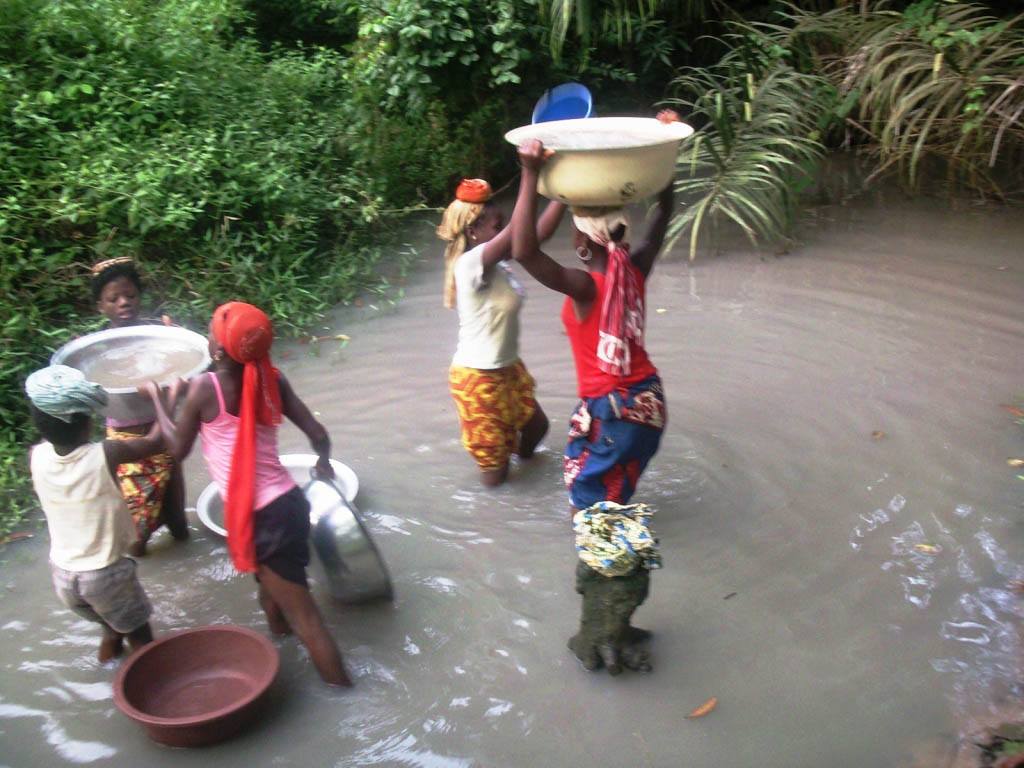
Women and girls in the Ivory Coast carry water from a pond
(Credit: Krishna/Flickr CC)
The world’s crises have gender bias, and climate change is no different. Women tend to pull the short straw, especially in the global South. According to a report by Oxfam, natural disasters hit poor communities first and worst, and since women make up approximately 70 per cent of those living below the poverty line, they carry heftiest burdens.
Many women of the global south are responsible for fetching water and fuel for the household. As climate change leads to drought and dries up water sources, women are forced to travel further to retrieve it. Girls also stop attending school to assist in these tasks and to save on school fees. It is common knowledge that lack of education leads to cyclical poverty.
Men often leave rural areas to find more profitable work, leaving women behind to farm the land to feed the family and to take care of children. Though women take on so much responsibility, they often don’t have basic rights. In some places, they cannot go to a clinic without a male escort or are not permitted to own land. This leaves women in a vulnerable position, constantly relying on men who may only be home for part of the year.
Natural disasters, on average, kill more women than men. According to a WHO study, a 1991 cyclone in Bangladesh killed 140,000 people, 90 per cent of whom were women. Bangladesh is a place where women are expected to be escorted by male members of their family, so even when emergency warnings were issued, many stayed inside waiting, in vain, to be led by a male companion. The traditional garment, the sari, also restricts movement, creating a hazardous situation during a tidal surge.
The same study also found that “In countries where women have the comparable status to men, natural disasters affect men and women almost equally.”
There are so many interconnected reasons why women are put in more dangerous situations, but lack of rights and education are the main culprits. Empowering women to fend for themselves, involving them in climate mitigation strategies, even teaching them how to swim can all lead to better outcomes for those worst affected by climate change.
The plights of women do not stop at the basic subsistence level; they often must work to protect themselves against sexual and domestic violence in the wake of disasters.
Because women are involved in so many different aspects of daily life and survival – from farming to household maintenance to child-rearing, they are acutely aware of how climate change affects their daily lives. It is essential that they participate in the process of implementing climate mitigation strategies. Women make up half of the world’s population, yet often have no say in the most critical of decisions that directly affect their own lives. Studies have shown that when women participate in these decisions, their survival rate goes up.
There are countless examples of women’s participation in climate mitigation and adaptation leading to positive outcomes. Wangari Maathai of Kenya empowered women to plant trees as part of the Green Belt Movement, which ended up influencing such initiatives far beyond Kenya’s borders. When women in Honduras and Guatemala joined in disaster preparedness discussions, there were no fatalities in the following hurricane.
Women have invaluable knowledge about adapting to climate change, but if they are treated as though they are not educated or important enough for their contributions to matter, then they will never feel empowered enough to join the discussion. Many historical norms keep women in a subservient role, but what is the value in that if lives are being lost because of it?
Countless studies show the value of bringing women into the conversation to adapt to climate change and implement mitigation strategies. New perspectives could create positive outcomes and reduce the loss of life. To the men in powerful positions who make decisions affecting thousands, shouldn’t you also hear from the people who make up half of the world’s population?
Sarah Sakeena Marshal
English Language Teacher
and Environmental Columnist